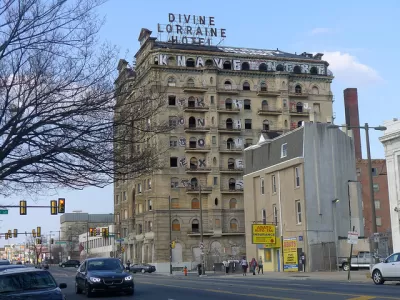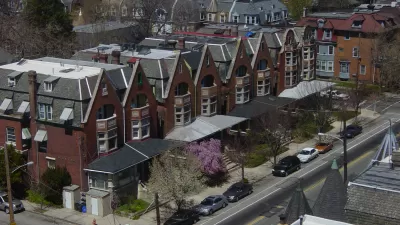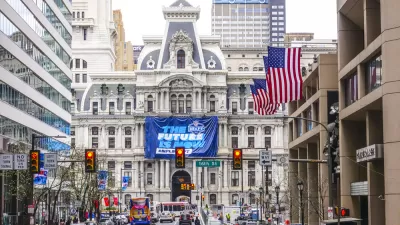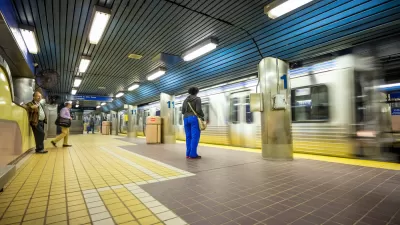Despite the historic importance of a vast majority of the city of Philadelphia's buildings, demolitions are happening at a faster rate than ever.

"Philadelphia’s history isn’t a burden," writes Ashley Hahn in the Philadelphia Inquirer, but it's certainly being treated that way. According to Hahn, "increasing numbers of old buildings are demolished annually by city contractors and private owners, landfilling reusable materials and untold histories."
While "[m]ore than two-thirds of Philadelphia buildings were built more than 50 years ago, making them potentially eligible for local historic designation on the basis of age alone," less than 3% of the city's buildings have historic designation. That protected segment, writes Hahn, "unfortunately reflects a predominantly white version of the city’s past."
"The city’s Department of Planning and Development is attempting to correct this failure through a grant-funded pilot project to develop and test a survey identifying culturally significant places overlooked by traditional preservation." The survey "will be driven by the communities whose histories the historic register has excluded, particularly Black Philadelphia."
The project, "done right," will likely take years. "The process could help build public trust in the city’s preservation system as it becomes less exclusionary and more representative of Philadelphia’s diverse heritage," writes Hahn, "[b]ut it does nothing to keep that history standing in the meantime." Hahn recommends that the city immediately "enact a demolition review policy, at least until a citywide survey is completed." Otherwise, " the city is undercutting its well-intentioned survey before it starts."
In other cities, permit applications to demolish buildings that meet "basic eligibility for local designation" trigger a review process. "It’s far faster to get a demolition permit than it is to designate a building as historic, which can take months. A demolition review policy would help level the playing field, instead of keeping it easy to level the city’s unprotected heritage."
FULL STORY: Welcome to Demodelphia, where our historic buildings are treated like a burden

Study: Maui’s Plan to Convert Vacation Rentals to Long-Term Housing Could Cause Nearly $1 Billion Economic Loss
The plan would reduce visitor accommodation by 25,% resulting in 1,900 jobs lost.

North Texas Transit Leaders Tout Benefits of TOD for Growing Region
At a summit focused on transit-oriented development, policymakers discussed how North Texas’ expanded light rail system can serve as a tool for economic growth.

Using Old Oil and Gas Wells for Green Energy Storage
Penn State researchers have found that repurposing abandoned oil and gas wells for geothermal-assisted compressed-air energy storage can boost efficiency, reduce environmental risks, and support clean energy and job transitions.

Santa Barbara Could Build Housing on County Land
County supervisors moved forward a proposal to build workforce housing on two county-owned parcels.

San Mateo Formally Opposes Freeway Project
The city council will send a letter to Caltrans urging the agency to reconsider a plan to expand the 101 through the city of San Mateo.

A Bronx Community Fights to Have its Voice Heard
After organizing and giving input for decades, the community around the Kingsbridge Armory might actually see it redeveloped — and they want to continue to have a say in how it goes.
Urban Design for Planners 1: Software Tools
This six-course series explores essential urban design concepts using open source software and equips planners with the tools they need to participate fully in the urban design process.
Planning for Universal Design
Learn the tools for implementing Universal Design in planning regulations.
Ascent Environmental
Borough of Carlisle
Institute for Housing and Urban Development Studies (IHS)
City of Grandview
Harvard GSD Executive Education
Toledo-Lucas County Plan Commissions
Salt Lake City
NYU Wagner Graduate School of Public Service





























